

How to teach when learning happens anytime and anywhere? - Novigado blog. By Marco Bento, the School of Education of Coimbra and the Research, Education, Training and Intervention Centre (ESEC)
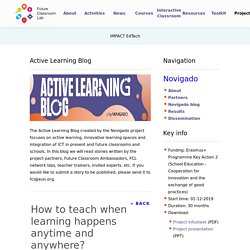
Weaving it all together: 9 key threads for maximising learning. This is a selection of things that I find myself discussing with teachers regularly.
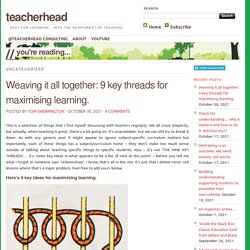
OECD Education Webinars - See the data, hear the experts! Ask an expert: What pressures do children feel in the 21st century and what can we do about it?

Childhood has changed significantly over recent decades. On a number of measures children’s lives have clearly improved: better public safety and support for their physical and emotional well-being. At the same time, children are reporting more stress and less sleep. Children in the 21st century are reporting more anxiety, including from increased pressure to excel in an ever more competitive educational environment. And over the last almost 30 years, socially prescribed expectations for perfection have increased, exacerbated by social media and the success culture that drives it. These issues beg the questions: What are the main sources of stress and pressure for children in the 21st century?
My First Lesson: A Detailed, Step-by-Step Overview of My First Lesson with New Classes – codexterous. Anticipating and micro-scripting expected classroom interactions can be a really powerful strategy, helping to ensure a consistent and finely-tuned message.
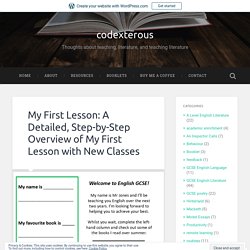
Whilst I wouldn’t do this for most lessons, enjoying instead free flowing and responsive dialogue, I do think this can be especially effective for the first lesson of a new academic year. This post outlines, step-by-step, what my first lesson will look like for any class, including A Level but with some minor changes. There may be minor differences across year groups, but this is a pretty standard format. Throughout this post, I’ll also try to explain the thought process behind each segment and how I would frame various routines to students.
For me, the focus of the first lesson should be about welcoming the class and establishing and rehearsing crystal-clear routines. No. 1: Welcome at the door. Are you an effective questioner? Lots aren’t. – LEARNING DESIGN by Paul G Moss. Use the AWCE (pronounced ORCE) CODE Asking questions is an essential part of assessing for learning, and thus good teaching, and yet I think it is a hugely underused skill.
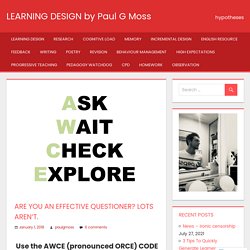
The awareness of questioning is there, with a large push resulting in it being covered in most schools’ CPD programmes, but how many teachers can say they are expert in and have mastered the approach? The understanding of effective questioning will always remain superficial unless it is practised repeatedly. It is an art form, and I reiterate: it must be practised many many times in order to master it. Having written about effective questioning strategies before, I think this updated thinking is simplified. When you ask a question, WAIT at least 5 seconds before you call on a student to answer. Ten Key Strategies to Implement Active Learning in Classrooms - Novigado blog. Photo by Jeswin Thomas on Unsplash Novigado invited different stakeholders to respond to the two questions: How should active learning look like in a school?
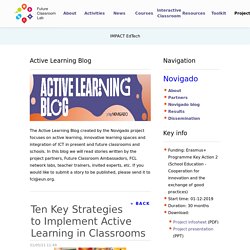
What would you recommend to teachers? Here, Ahmet Göçen, Assistant Professor in Harran University Education Faculty in Turkey, shares his perspective on how active learning should look like in schools. According to Ahmet, active learning means involving students in the goals of lesson through discussions, problem solving, case studies, role plays and other in-class methods. It requires the full participation of all students in learning activities, and education processes that are attractive to the needs of diverse students in the same class. What is ENGAGEMENT? – LEARNING DESIGN by Paul G Moss. The more we know about how information is encoded and then retrieved from our memories the more we can have faith in our teaching methods.
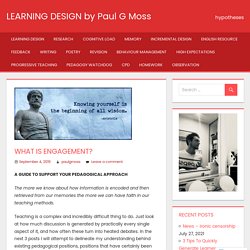
Teaching is a complex and incredibly difficult thing to do. Just look at how much discussion is generated by practically every single aspect of it, and how often these turn into heated debates. In the next 3 posts I will attempt to delineate my understanding behind existing pedagogical positions, positions that have certainly been mercurial over the past few years because new ideas about the encoding of information and how those encodings are retrieved have entered the mainstream. This new awareness of research into encoding, through its logic, makes for an ineluctable argument for teachers to carefully consider curriculum design more than ever before. The more we know about how information is encoded and then retrieved from our memories the more we can have faith in our teaching methods. Engagement. Learning vs. Performance: A Distinction Every Educator Should Know.
Audiblogs- A Tool That Turns Any Web Page into Audio Podcast. TOT100: 100 weeks of Teacher Ollie’s Takeaways!!! Dear readers.

This is, indeed, a momentous occasion. We’ve made it to 100 TOTs. That means 100 weeks of sharing my favourite takeaways from twitter, blogs, podcasts, and much more. To commemorate the 100th TOT, I contacted some of the most featured tweeters from the past 99 TOTs and asked them to share three of their favourite tidbits of education goodness. Below we hear from Tom Sherrington, Harry Fletcher-Wood, James Mannion, Adam Boxer, and Michael Pershan, each with 3 recommendations for your education edification. Thanks for your engagement and I hope you enjoy this 100th TOT!
Note: I’m constantly on the lookout for good blogs from contributors from a variety of backgrounds (gender, race, etc) and I’d love for the next 100 TOTs to be more balanced in this respect. If you’d like to support Teacher Ollie’s Takeaways and the Education Research Reading Room podcast, please check out the ERRR Patreon page to explore this option. How to Use Peer Feedback to Enhance Performance. We probably all realize that feedback is important, particularly in the workplace.
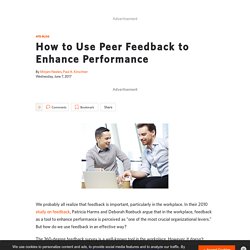
In their 2010 study on feedback, Patricia Harms and Deborah Roebuck argue that in the workplace, feedback as a tool to enhance performance is perceived as “one of the most crucial organizational levers.” But how do we use feedback in an effective way? The 360-degree feedback survey is a well-known tool in the workplace. However, it doesn’t always do what it’s supposed to: Support learning and enhance performance. There are several reasons why this is the case. Books for English Teaching — Julian Girdham. 12 Tips for Teaching in a Virtual Environment. @TeacherToolkit In 2010, Ross Morrison McGill founded @TeacherToolkit from a simple Twitter account through which he rapidly became the 'most followed teacher on social media in the UK'.

In 2015, he was nominated as one of the '500 Most Influential People in Britain' by The Sunday... Read more about @TeacherToolkit How can teachers adapt to teaching online? A serious lack of funding over the last decade had already seen English state schools struggling to meet the needs of pupils. In a new research paper, 12 Tips for Pivoting to Teaching in a Virtual Environment published by the University of Manitoba, academics offer tips to provide insight on the practice of teaching in virtual [health] environments, from course design, to student engagement, to assessment practices, to maximising the potential that technology can provide for both the [teacher] and the students.
Is Everyone Thinking? What are they all thinking about? This is THE Key. “Memory is the residue of thought”. As part of my work with Oldham College, this week we were revisiting the key ideas that underpin our Teaching for Distinction programme. Right at the top is Dan Willingham’s work on memory including this important and famous statement: memory is the residue of thought. Three Reasons Classroom Practice Conflicts With Evidence On How Kids Learn. Over the last several decades, psychologists have unearthed a wealth of evidence on how children learn. But for three basic reasons, it’s proven hard to translate that evidence into classroom practice. Cognitive scientists—those who study the learning process—have found that students retain information best through things like spaced practice (distributing learning over a period of time rather than cramming), interleaving (switching between different topics), and retrieval practice (trying to recall information that has been partially forgotten).
But few teachers incorporate those practices into their lesson plans or suggest that students use them to study. More fundamentally, there’s overwhelming evidence that, especially when students don’t know much about a topic, it’s best to provide information explicitly. The reasons for the disjunction between the worlds of education and science are complex. When introduced to evidence from cognitive science, many teachers eagerly embrace it. How to Design Online Courses That Are Full of Surprises. The following is the latest installment of the Toward Better Teaching advice column. You can pose a question for a future column here. Dear Bonni, Checking For Understanding: Rediscovering the Lost Art of Questioning – Jon Gustafson. Mike Schmoker sounded the alarm when he wrote in Results Now that “for the majority of lessons, no evidence exists by which a teacher could gauge or report on how well students are learning.”
In an interview, author and former teacher Tom Sherrington said “as a profession, we need to think harder about how to engineer more time-efficient ways to check for understanding across a class…checking for understanding is something which needs to be way higher in teachers’ consciousness.” What’s so important about asking students questions while teaching, and why is it so hard for teachers to do this consistently?
What are some of the most time-efficient ways to check all students’ understanding, and what’s at stake when we fail to formatively assess students? Pedagogy Beats Curriculum The importance of knowledge-rich curricula for improving overall literacy has gained traction lately, and this is a major step in the right direction. Checking For Understanding: Rediscovering the Lost Art of Questioning – Jon Gustafson. - EERA Blog. Studying to the HILT: Why Learning Should Look More Like Exercise. How to Avoid the Student Engagement Trap. As Mr. James starts today’s class about volcanoes, he shares one of his all-time favorite wonder moments: “The loudest known sound was made by a volcano called Krakatau, in Southeast Asia.
When Krakatau erupted in 1883, it was reported to have sounded like 15,000 nuclear bombs! Like 200 megatons of energy! What do you imagine a volcano eruption sounds like?” Teacher educator conversations prompted by the COVID-19 pandemic: opportunities and responsibilities (post 2) – InFo-TED. Our identities have changed somewhat as a result of the many changes to our professional routines, norms and practices coupled with changes and adjustments in our personal routines. Teacher educator conversations prompted by the COVID-19 pandemic: opportunities and responsibilities (post 3) – InFo-TED. On March 12th, 2020, the HEIs closed. As work moved from our educational institutions, complete with offices, corridors, lecture theatres, tutorial rooms and staff rooms, to our homes, we also moved from the physical world to the virtual world of work.
In designing these new structures, attention was paid to the new architecture of the learning space. Time for schools to give short outdoor play multi-breaks a go. IDDblog: Instructional Design Tips, Advice, & Trends for Online & Distance Learning. The Ultimate Guide to Advertising in 2020. When you hear the word advertising, what comes to mind? How to Write a Blog Post: A Step-by-Step Guide [+ Free Blog Post Templates] You probably already know how integral the process of blogging is to the success of your marketing efforts. How to Write a Blog Post: A Step-by-Step Guide [+ Free Blog Post Templates]
How to Write a Blog Post: A Step-by-Step Guide [+ Free Blog Post Templates] Start Here. English and Children's Literature. Illustrators, when trying to convey their own message in a picturebook, will be calling upon all the skills of their known craft. At the other end, we readers are there as receivers of this information but we too bring all our skills and knowledge to that reading process and these will, doubtlessly, be different from what the illustrator brings. This meaning making then is, in part, a multifaceted process and just as the writer can use certain words or grammar to affect the way we feel about someone or something, so too can illustrators use a visual grammar to do the same.
Doing your Education research project. SweetSearch - A Search Engine for Students. Are Australian students receiving the school education they deserve? Opinion Posted about 3 hours agoSun 8 Mar 2020, 8:51pm. New research shows we trust and appreciate our teachers – but overworked teachers aren’t feeling it. Teachers in Australia are struggling with workload and feeling underappreciated, and almost six in ten say they intend to leave the profession.
What Advice Would You Give a Student Teacher? Harvard Researchers Found That One Approach to Learning Is the Most Effective — But There's a Catch. October 2016 – Success. Films — Graham Brown-Martin. EEF Blog: Does research on ‘retrieval practice’ translate into classroom practice? Why pedagogy matters for innovative teaching - OECD Education and Skills Today. Course: ED633[A] — Teaching and Learning English (2019-20:Year-long) Happy 25th year, blogging. You’ve grown up, but social media is still having a brawl. Behaviour: Three ways to reset your troublesome class. Research-based Principles of Instruction Applied to Workplace Learning. Are Comprehensive Reading Assessments Unfair? No Comprehension Without Prior Knowledge. The ‘Washing Hands’ of Learning: Think Pair Share. Blog of the week. 5 Ways to Help Your Students Become Better Questioners.
The 6 Facets Of Understanding: A Definition For Teachers - 12 Questions To Ask Your Students On The First Day Of School - Failed Economics: Tyranny of Mathematics and Enslaved by the Wrong Theory. FCL Summer Academy. Cultivating Curiosity in Teens. The madness of writing Schemes of Work or how I fell in love with curriculum design. A new manifesto for evidence-based education: twenty years on. A blog about my open learning experiences … and a few other bits of ordinary life. The difference between teaching and instruction. We Don’t Trust Course Evaluations, but Are Peer Observations of Teaching Much Better? Analysing the purpose and value of universities. Modelling: some thoughts on thinking aloud - Primary Education Network. Just Say No (To Providing Class Slides)? Best Practice For Schools When Creating Microsoft Teams For Education. The Entire Archives of Radical Philosophy Go Online: Read Essays by Michel Foucault, Alain Badiou, Judith Butler & More (1972-2018) ‘So many of our children had a loss to mourn. Isn’t that what poetry’s for?’
Letter to Editor: Testing times in primary schools nationwide. How research on reflection has changed my view on reflective practice – InFo-TED. 'Don't believe the myths about Finnish education' Strategies for Coaching Educators in the Digital World. How Can Mindfulness Teach Surface, Deep and Transfer Learning? - Peter DeWitt's Finding Common Ground. In no particular order- my top 20 blogs on education… – Springpad. University of Cumbria. The ORID Method (Objective, Reflective, Interpretive and Decisional) - Extension Practice. Going Deeper. Between a hard place and a hard place: A study of ethical dilemmas experienced by student teachers while on practicum. Between a hard place and a hard place: A study of ethical dilemmas experienced by student teachers while on practicum.
Blog posts. Blog posts. Artificial Intelligence for Educators. Why Can’t Learning in the Analog and Digital Just Get Along? – techKNOWtools. Factory education fails everyone. Collaborative Classrooms Support Social-Emotional Learning. Curriculum: concepts and approaches – Professor Mark Priestley. The grim reality of life as a pupil in a Scottish school – Harriet Sweatman. Why progressivism matters.